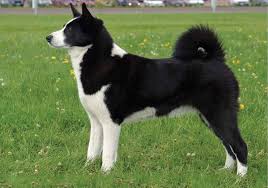
Karelian Bear Dog
Conditions of detention
Karelian Bear Dogs thrive in rural or semi-rural environments where they have plenty of space to roam and exercise. They are well-suited for homes with large, secure yards or access to open areas where they can satisfy their high energy levels and hunting instincts.
Useful Fact: These dogs are best suited for outdoor activities and need a significant amount of daily exercise to stay healthy and happy.
Nutrition and diet
A balanced diet rich in high-quality protein, fats, and essential nutrients is crucial for a Karelian Bear Dog’s health. Both high-quality commercial dog food and well-prepared homemade diets can meet their nutritional needs.
Useful Fact: Karelian Bear Dogs may benefit from a diet that includes lean meats, reflecting their traditional diet as hunting dogs.
Health
Karelian Bear Dogs are generally healthy with a lifespan of 10-14 years. They can be prone to certain genetic conditions such as hip dysplasia and eye issues, but overall they are robust and resilient.
Useful Fact: Regular veterinary check-ups and a balanced diet can help prevent most common health issues in Karelian Bear Dogs.
Grooming and care
Karelian Bear Dogs have a thick double coat that requires regular grooming. Their coat is typically black with distinctive white markings. Regular brushing helps to manage shedding and keep their coat healthy.
Useful Fact: During shedding seasons, typically twice a year, more frequent brushing is recommended to manage their dense fur.
Education and training
Karelian Bear Dogs are intelligent and independent, often requiring a firm and consistent approach to training. Positive reinforcement methods work best, as these dogs respond well to respectful and fair handling.
Useful Fact: Early socialization and obedience training are crucial for Karelian Bear Dogs to develop into well-mannered adults, helping them balance their hunting instincts with sociability.
Toys and entertainment
Karelian Bear Dogs enjoy toys that challenge their minds and provide physical exercise. They particularly love activities that involve tracking and hunting, as well as interactive toys that stimulate their intelligence.
Useful Fact: Providing toys that encourage mental stimulation and physical activity can help prevent boredom and destructive behaviors in Karelian Bear Dogs.
Safety
Ensure your Karelian Bear Dog has a secure, fenced yard to prevent them from wandering, as their strong hunting instincts can lead them to roam.
Useful Fact: Karelian Bear Dogs are naturally alert and make excellent watchdogs, but their protective instincts should be managed with proper training to prevent over-guarding.
Accessories
A sturdy leash, comfortable harness, and ID tags are essential for your Karelian Bear Dog’s safety during walks and outings.
Useful Fact: Due to their strength and agility, Karelian Bear Dogs benefit from wearing a harness rather than a collar, as it helps distribute pressure evenly and prevents neck strain during walks.
Socialization
Early and continuous socialization is crucial for Karelian Bear Dogs to ensure they are comfortable around people, other dogs, and different environments.
Useful Fact: Positive socialization experiences from a young age can help Karelian Bear Dogs develop into well-adjusted adults, reducing the likelihood of fear or aggression.
Travel and Transportation
Karelian Bear Dogs can travel well if accustomed to it from a young age. Ensure they have a comfortable crate or seatbelt harness for car rides.
Useful Fact: Regular short trips can help your Karelian Bear Dog become more comfortable with travel and reduce anxiety during longer journeys.
Behavior and psychology
Karelian Bear Dogs are known for their loyalty, intelligence, and strong hunting instincts. Understanding their behavior and providing appropriate outlets for their energy is important.
Useful Fact: Mental stimulation through training and interactive play is as important as physical exercise for a Karelian Bear Dog’s well-being.
Legal aspects
Owning a Karelian Bear Dog may come with specific legal requirements depending on your location, such as licensing, microchipping, and adherence to leash laws.
Useful Fact: Research local regulations and ensure you comply with any breed-specific legislation or requirements.


